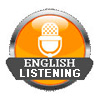|
Utilizamos los "question tags" para confirmar lo que sospechamos o preguntar si alguien está de acuerdo con nosotros. El "question tag" siempre sigue una oración afirmativa y no una pregunta.
Veremos que normalmente que con este tipo de "question tag", cuando la oración es afirmativa, el "question tag" es negativo y viceversa. Además, nos fijamos en que solamente se permiten los pronombre personales, y los pronombres"it" o "there" en el "question tag":
|
|
This is yours, isn't it?
|
Es tuyo, ¿no es así?
|
|
He isn't going, is he?
|
Él no va a ir, ¿verdad?
|
|
There's one missing, isn't there?
|
Falta uno, ¿no?
|
|
I'm invited too, aren't I?
|
A mí me invitan también, ¿cierto?
|
|
I'm not in the photo, am I?
|
No estoy en la foto, ¿verdad?
|
|
They love it, don't they?
|
Les encanta, ¿verdad?
|
|
Paco hates her, doesn't he?
|
A Paco le odia, ¿verdad?
|
|
They haven't got any, have they?
|
Ellos no tienen, ¿verdad?
|
|
Jane has her car, hasn't she?
|
Jane tiene su coche, ¿verdad?
|
|
You would help, wouldn't you?
|
Ayudarías, ¿no?
|
|
Jenny can't go, can she?
|
Jenny no puede ir, ¿verdad?
|
|
It might not happen, might it?
|
Puede que no ocurra, ¿verdad?
|
|
He might come, mightn't he?
|
Puede que venga, ¿verdad?
|
|
It may happen, mightn't it?
|
Puede que ocurra, ¿verdad?
|
|
She had a shower, didn't she?
|
Tomó una ducha, ¿verdad?
|
|
Las palabras como "nothing", "nobody" etc. son negativas y por tanto toman un "question tag" afirmativo. "Nobody" toma el pronombre, "they":
|
|
Nothing serious will happen, will it?
|
No va a pasar nada, ¿cierto?
|
|
There's nowhere to go, is there?
|
No hay dónde ir, ¿no es así?
|
|
Nobody left a message, did they?
|
Nadie me ha dejado un recado, ¿verdad?
|
|
Podemos utilizar los "question tags" con las frases en el imperativo (órdenes o instrucciones). El uso de "won't you?" en un "question tag" normalmente suena muy educado y formal sobre todo si colocamos "do" delante del verbo:
|
|
Do sit down, won't you?
|
Por favor, siéntese.
|
|
Si nos ofrecemos a hacer algo con "I'll" or "we'll" o utilizamos la estructura "let's", se prefiere "shall" en el "question-tag":
|
|
I'll help you with those bags, shall I?
|
Le ayudaré con esas bolsas ¿no?
|
|
Let's go, shall we?
|
Nos vamos, ¿no?
|
|
Con los demás auxiliares: "can", "can't", "will" y "would" no hay realmente preferencia y se puede emplear el uno o el otro tampoco importa si el "tag" es afirmativo o negativo:
|
|
Open a window, would you?
|
Por favor, abre una ventana.
|
|
Help me out, will you?
|
Ayúdame, por favor.
|
|
Do it properly, can't you?
|
Hazlo bien, ¿quieres?
|
|
Sin embargo, en le caso de los imperativos negativos, solamente podemos utilizar "will you?":
|
|
Don't forget, will you?
|
No te lo olvides, ¿vale?
|
|
Estos "question-tags" pueden aumentar el tono de agresividad combinados con un imperativo coloquial e insultante:
|
|
Get lost, will you?
Shut up, can't you?
|
¡Lárgate! ¿quieres?
¡Cállate! ¿quieres?
|
|
Solamente podemos utilizar "will you" después de un imperativo negativo:
|
|
Don't tell John, will you?
|
No digas nada a John, ¿vale?
|
|
Algunas combinaciones auxiliar de la frase afirmativa y auxiliar del "question-tag" no son posibles:
|
|
I am next, aren't I? (y no, amn't I?)
|
El siguiente soy yo, ¿cierto?
|
|
I may go after I finish this exercise, can't I? (y no, mayn't I?)*
|
Puedo irme cuando termine este ejercicio, ¿no?
|
|
It may be what you were looking for, mightn't it? (y no, mayn't it?)*
|
Igual es lo que estabas buscando, ¿verdad?
|
|
*"Mayn't" sí existe en el Oxford English Dictionary pero es muy poco utilizado, por lo menos en el inglés EE.UU y del Rieno Unido. Los "question tags" aquí son posibles maneras de evitarlo.
Ver más excepciones a las reglas de los "question tags"...
|
|
Con "so" (así que), los "question-tags" son afirmativos como el verbo. Expresan interés, sorpresa e incluso enfado dependiendo del tono de voz:
|
|
So you're Colombian, are you?
|
¡Así que es colombiano! ¿cierto?
|
|
So you're not Colombian, are you?
|
¡Así que no es colombiano, ¿verdad?
|
|
So he spent it all, did he? Idiot!
|
Así que lo gastó todo, ¿eh? ¡Idiota!
|
|
Si estamos confirmando algo que anteriormente sospechamos, la voz baja en la última sílaba del "question-tag". No solemos esperar una respuesta:
|
|
1) You have sugar in your tea, don't you? ...
|
Tomas azúcar en el té, ¿cierto?
|
|
2) There isn't any milk left, is there? ...
|
No queda nada de leche, ¿verdad?
|
|
3) You went out last night, didn't you? ...
|
Saliste anoche, ¿no es cierto?
|
|
4) John hasn't seen this report yet, has he? ...
|
John no ha visto este informe todavía, ¿cierto?
|
|
Si no estamos seguros de lo que decimos y pedimos que nos contesten sí o no, la voz sube en la última sílaba:
|
|
1) Escuchar ...
|
|
|
2) Escuchar ...
|
|
|
3) Escuchar ...
|
|
|
4) Escuchar ...
|
|
